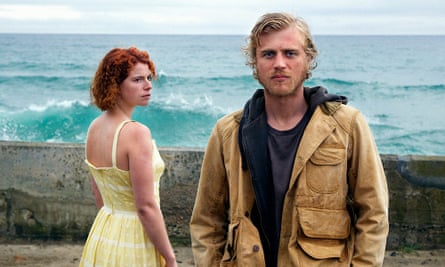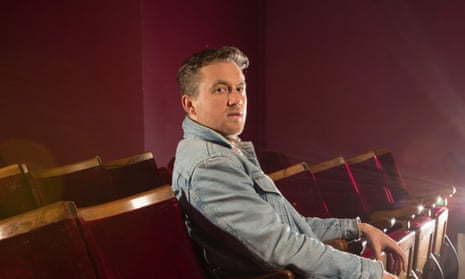Five years ago, in his early 30s, the director Michael Pearce was skint, earning £8 an hour as a chugger in London. He had been sticking to an all-or-nothing career plan he devised not long after graduating from film school in 2008: instead of working his way up through the film industry, he would focus on making shorts, earning money on the side by doing charity fundraising. As a strategy, it was beginning to look a bit harebrained. “There was a certain point where I just thought: ‘Am I doing the right thing?’” he says.
His nadir was a freezing winter pounding the streets with a clipboard, occasionally bumping into friends from film school now working as successful TV directors. The experience was excruciating: “I’d be standing there thinking: ‘Oh no, are they going to see me?” he says. “Everyone was becoming grownups and buying houses. Here I was, fundraising. There was no backup plan. It was risky. But I was very adamant that I’d crack it one day or die trying.”
Well, the risk paid off. Here he is, very much alive, with a buzzed-about debut feature film under his belt, the psychological thriller Beast (in cinemas on 27 April). It took Pearce seven years to make and stars Jessie Buckley as Moll, a damaged 27-year-old who lives at home with her folks in genteel suburbia on the island of Jersey. When she meets Pascal (Johnny Flynn), a local bad boy, it looks like Moll has found a knight in a scruffy T-shirt to save her. But then the police name Pascal as the prime suspect in the murder of four teenage girls. Is he a serial killer?
I meet Pearce in a coffee shop in Hackney, east London, near Pearce’s house. He already looks the part of hotshot film-maker in a black T-shirt and jeans, Ray-Bans on the table – he carries himself with confidence. Two minutes before I arrive, he texts to ask for my coffee order; he has the air of someone who gets things sorted with minimum flap or faff.
On paper, Beast sounds depressingly familiar: yet another film about a serial killer running around butchering women willy-nilly. But it is cracking. It reminded me a little of Get Out, with its blend of arthouse cleverness and barnstorming thrills.

“I didn’t want it to be a gloomy, small British psychological thriller,” says Jersey-born Pearce, who joins the explosion of exciting new British film-makers expanding the idea of what is expected of a “Brit film”, alongside William Oldroyd (Lady Macbeth), Rungano Nyoni (I Am Not a Witch), Francis Lee (God’s Own Country) and Hope Dickson Leach (The Levelling).
Beast might be set on Jersey, but Bergerac it ain’t. Pearce’s starting point was a real-life psychopath, the serial rapist and paedophile Edward Paisnel, known as the Beast of Jersey. He terrorised the island for a decade, breaking into houses and kidnapping children out of their beds, until his arrest in 1971. By the time Pearce was growing up on Jersey in the 80s, Paisnel had become a bogeyman. “Kids would tease each other. ‘Don’t go into those woods.’ The whole island knew about him,” he says.
Pearce did not want to make a Zodiac-style true-crime story about the Beast of Jersey. It did not feel right: “The victims are still around.” But, while researching the case, he learned that Paisnel’s wife had been completely in the dark about his crimes. “Of course, the first thing a lot of people say is: ‘She must have known.’ But all the research I was doing on psychopaths showed that, well, they’re very charismatic and charming. You don’t know.” He found the idea of the unsuspecting wife or girlfriend, a character usually pushed to the periphery of a story, interesting.
For two summers, he spent eight hours a day at the British Library reading about Ted Bundy, Ian Huntley, Jeffrey Dahmer and other notorious killers. It became his only topic of conversation. “I’d meet a friend for a beer. They’d go: ‘How’s your week been?’ All I’d have was psychopaths. I wasn’t great company.” Aware of his limitations as a man writing a female character, he showed drafts of the script to his two female producers to get their opinion on Moll. “I’m a white, middle-class man. I have a ton of blind spots,” he says. But he has written a genuinely interesting female lead, who has a dark secret and is not quite the wilted damsel she appears to be on first impression. He calls the film “an origin story of an antiheroine”; to say any more would seriously spoil things.
Pearce grew up on Jersey, raised along with his brother by his dad after his mum died when he was seven. It was a happy and loving house, but not exactly big on culture. “My dad was really into sports, golf, cricket and rugby. I had zero interest in these things. The only books we had were climbing books. If my dad read to us, he’d read these horrific, intense accounts of someone going up the face of a mountain and dying halfway up.”
As a teenager, Pearce could not wait to escape the island. He thought he might like to become a painter and dreamed of moving to a big city. At 16, he went to art school, where a lecturer gave him a stack of VHS tapes of arthouse cinema. “Within a week of watching Seven Samurai, I was like: I want to do what that guy did.”
He went on to the National Film and Television School, earned a Bafta nomination for his 2013 short Keeping Up With the Joneses and made some adverts along the way. This was all part of his master plan to make a full-length film: “I just wanted to continue to make shorts until I could look at one of my shorts and go, almost objectively, like I hadn’t directed it: ‘I think this person’s strong enough to make a feature now.’”
Beast is a mystery, but there are no red herrings or McGuffins. Pascal is the lead suspect in the murder case. The question is: did he do it? Pearce won’t spill his interpretation of the ending. For a while, he would whisper it to people one-to-one. Often, they were able to convince him that he was wrong. “They’d give me an account and it’d actually make a lot of sense.”
Looking back now, Pearce says, he is glad he never earned much in his early 30s. “I never got used to any lifestyle. All my chips were on making movies.” Even the chugging? That was worth it? “Yes, definitely. I think it helped. Having to pitch a charity, it’s like pitching a film. You have to try to convince people in the space of 30 seconds.”
